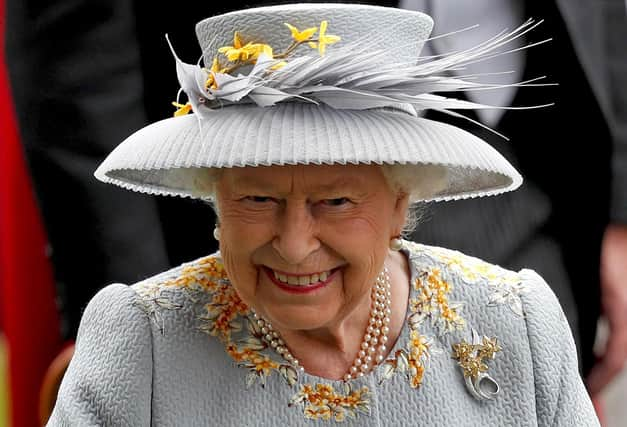We should elect the monarch - and banish a millennium's worth of privilege


So why don't we elect the position of monarch and keep the constitutional system?
Choose the Queen and banish a millennium of privilege passed as a novelty. What could be more British than keeping the best of our system and discarding the worst?
Advertisement
Hide AdAdvertisement
Hide AdIn 'The English Constitution' (1867), Walter Bagehot famously wrote that a constitutional monarchy offered a 'dignified' system. People could love the symbol of the country but despise the 'efficiency' of politicians.
Winston Churchill knew fine well that the 'dignified' was an impossible standard. He vehemently opposed cameras at the Queen's coronation in 1953. He argued it would expose the whole thing as mediocre, not majestic.
Flashforward to the 24/7 news cycle and Churchill was right. The Queen's weaknesses have been carefully locked away. She is the last model of Bagehot's principle. The next generation is the issue. As they always have been.
King Edward VII, Queen Victoria's son, kept mistresses and his grandson, the Duke of Kent, was reportedly a user of morphine and cocaine.
Even King George VI, the Queen's father, was involved with a married woman before ascending to the throne. He was given a dukedom by his father on the condition that he "heard nothing more" about the liaison. That’s to say nothing of Edward VIII and Wallis Simpson in 1936. And none of us needs to rehash the crises to befall the Firm in the 1990s.
What Harry and Meghan have achieved is to role reverse the historical perspective. The public has looked at the duties and responsibilities of those in the system, to the system. Discussion seldom centres on how the constraints on its participants are impossibly unrealistic from the cradle to the grave. It is beyond human limits to ask anyone to be the living embodiment of the state without a choice. 'Shut up, you've got a palace or two and plenty dosh' is not a justification for a political system.
So it's not such an absurd idea to propose the monarch be elected – certainly no more ridiculous than defending the current arrangement. Edmund Burke famously remarked: "To make us love our country, our country ought to be lovely." Prisons made of hereditary bars is hardly democratic. Senior Royals being 'allowed' to speak out is not a good example in the mother of all democracies.
The monarchy is a hydra evoking very confused and contradictory loyalties. That's the curse of people being made living martyrs in an anthropomorphised political hierarchy. Celebrity obsession compounds the problem, particularly against younger Royals, when an entire industry feeds the public their bread and circuses.
Advertisement
Hide AdAdvertisement
Hide AdIt's at the point of just one big Mobius loop. Unhappy Royals condemn the media; the press eats them alive, all underpinned by rampant tabloid consumerism and celebrity worship. The Americans, bless their hearts, thought they got rid of that back in 1776. Their manic celebrity culture is monarchy by another name; ours is just institutionally political to boot.
The role is hardly devoid of political power or influence. Prince William meeting with Gordon Brown to allegedly discuss the state of the Union is an innately political act. Armies and members of Parliament pledge their loyalty to the Crown— 'power without responsibility, the prerogative of the harlot throughout the ages,' warned Rudyard Kipling. That might be updated to read 'power without accountability'.
To defend the UK's monarchy and aristocracy is usually based on the global 'prestige' and 'soft power’ it elicits. A living, breathing embodiment of the state should not descend into gutter politics - but it needs to derive its awesome power from something other than the argument 'it's always been this way’ or fear of change.
At the very least, electing the monarch would be a halfway house between nostalgic indulgence and outright republicanism. And there is a precedent for it. A system of elective monarchy existed in Anglo-Saxon England. In 14th, 15th, late 17th, and early 18th century England, the Parliament effectively asserted that the Monarch was elected.
The Glorious Revolution of 1688 led the way to a constitutional over an elective monarchy. Restrictions and limits with laws including the Bill of Rights 1689 and the Act of Settlement 1701, and the Magna Carta in 1215 consolidated the process of restrained hereditary rulers.
In Scotland, tanistry and elective monarchs were in place until King Malcolm II introduced direct inheritance in the 11th century. Then the Declaration of Arbroath of 1320 asserted the rights of the nobles to choose a King if required, and by the Convention of Estates, which enacted the Claim of Right Act 1689, limits were placed on the Scottish monarchy.
By the time constitutional monarchy well established, the UK Parliament made no further amendments in the succession to the British throne leading to the present status quo.
The monarchy is usually deemed as beyond repeal because it is the least offensive of British institutions. While you can easily criticise the government, the BBC and the NHS because they affect public life, the monarchy is the definition of banal nationalism – just sort of there, doing its thing. But that is not really the case.
Advertisement
Hide AdAdvertisement
Hide AdIt has been a complicated and evolving institution deriving, at one time or other, its power by being granted, not entitled. Surely a return to such a discussion point would do the public and the incumbents good.
*
Alastair Stewart is a freelance writer and public affairs consultant. You can follow Alastair @agjstewart and read more from him at www.agjstewart.com